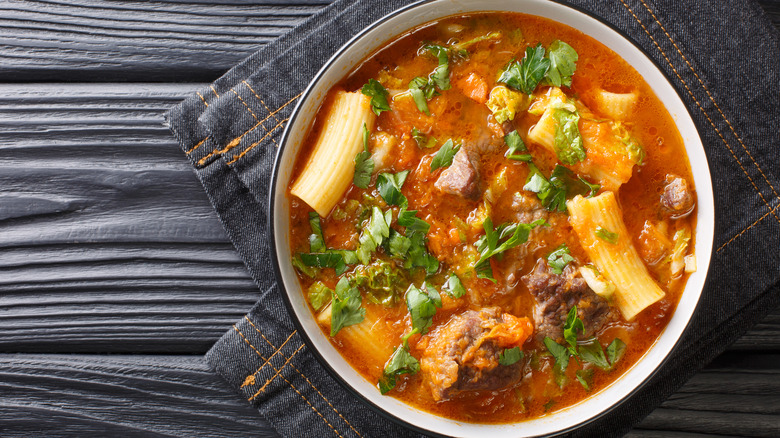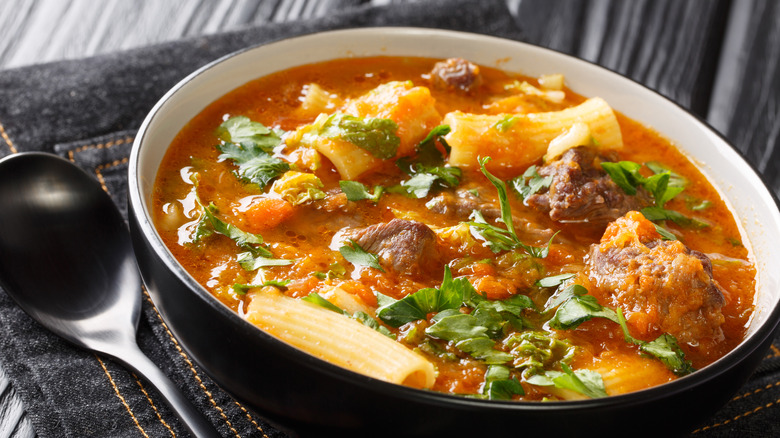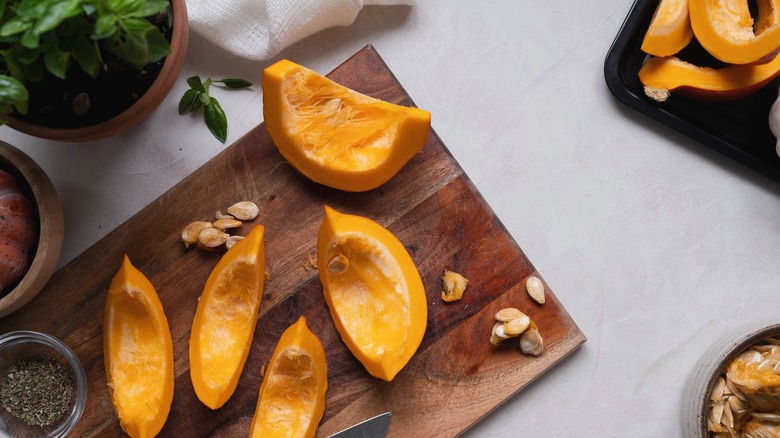Why Soup Joumou Holds A Special Place In The Hearts Of Haitians
Every January 1st, people around the world eat New Year's foods believed to bring good fortune. While Spain and other Spanish-speaking countries eat 12 grapes to ring in the new year, and African Americans eat black-eyed peas for good luck, others follow similar superstitions in the hopes that a good year to come is nothing more a mouthful of food away.
Meanwhile, Haitians have their own tradition. The Caribbean nation and its descendants celebrate every new year by eating a unique dish called soup joumou, which is native to the country of Haiti. The base of this soup, made from squash found in the Caribbean, is combined with hearty vegetables to yield a hearty concoction that fills the stomach and soothes the soul as only the best comfort foods can.
While the phrase joumou translates to "pumpkin soup," there is so much more at play here. Haitians prepare and eat the soup as a way to celebrate their independence from France, their former colonizers, and it has become a rich part of their heritage.
What is the history of soup joumou?
For 300 years, Haitians lived under French colonial rule. Once the nation was handed over to the French, they relied on the African slave trade to create a new workforce for the plantations.
Capturing double the amount of Africans taken to North America, the French forced 800,000 enslaved people to work on the thousands of sugar, coffee, and indigo plantations that inhabited the country. Among the roles of the enslaved was to prepare soup joumou for the French. Despite being made from calabaza, a squash native to the Caribbean and Latin America, the Haitians weren't allowed to eat the soup themselves.
In 1791, enslaved Haitians in the northern region decided to revolt. The catalyst for a 12 year rebellion, the Haitian Revolution swept the nation, with enslaved people organizing wars and revolts against the French. Although the French were aided by the British army and the U.S. government, the Haitians won independence on January 1, 1804, becoming the first freed Black country. The nation's first empress, Marie-Claire Heureuse Félicité Bonheur Dessalines, doled out soup joumou to the Haitians, celebrating at last the sweet taste of freedom.
How is soup joumou eaten today?
After Haitians took their freedom by force, the French planned a revolt of their own. Haitians were told to pay back their slave masters' descendants in Russia, Germany, and Brazil, with the bulk of the cash going to the French. The European nation demanded that Haitians pay 100 million francs, an estimated $21 billion today. The country's crippling debt to France, coupled with natural disasters, created an exodus from the island nation.
As Haitians created new homes across the globe, soup joumou began taking on different forms. Today, it is still consumed to remember the past and celebrate Independence Day. Sometimes the soup is now eaten with spaghetti, varying types of pasta, or bread. Chunks of beef or goat meat seasoned with epis, a type of cooking paste, are also typically added to the dish.
It's customary for soup joumou to be eaten every New Year's Day — in fact, it's eaten three times a day. It is also consumed at special occasions, and during Sunday dinners.
How is soup joumou made?
The star of soup joumou is calabaza, a pumpkin-like gourd that's sweet like butternut squash. Cut up the calabaza (or pumpkin, if it can't be sourced) and boil it until it's soft. Place it in a blender or food processor, then purée until the squash is smooth. If adding meat into the soup joumou, pour the puréed squash into the pot of cooked meat and let it simmer on low to medium heat.
With the soup base cooking, take chopped cabbage and peeled carrots and potatoes and add it into the pot. Pouring in a few cups of water, stir everything together. Add in fresh thyme, parsley, and rosemary to flavor the soup. Allow the soup to simmer until the added vegetables are tender.
While the soup cooks for around 25-30 minutes, boil the pasta to be consumed with the soup joumou. Add the cooked pasta into the pot of soup, then mix well.



